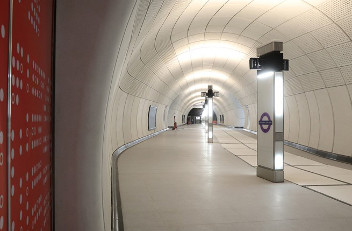Capital expenditure by local authorities in England totalled £26.3bn in 2019-20, with highways and transport leading the way at £7.5bn.
The Ministry of Housing, Communities and Local Government (MHCLG) has published Local Authority Capital Expenditure and Receipts, England: 2019-20 Final Outturn, which reveals that overall capital spending was down £251m (1%) in real terms from 2018-19.

Tottenham Court Road's as yet unopened Crossrail station
Although highway and transport services remained the largest area of spending, it was down £468m (6%) in real terms from the previous year.
On the other hand, spending on housing services rose by £533m (10%) in real terms from 2018/10 to £6.1bn in 2019-20. Housing remained the second largest area of spend.
Prudential borrowing continued to be the largest source of financing at £11.5bn, which was up £1.3bn (13%) in real terms from 2018-19.
The MHCLG said the amount of expenditure financed from this source has doubled since 2015-16.
Capital receipts totalled just £2.8bn, which was £1.3bn (31%) lower in real terms compared to 2018-19.
Capital spending on highways and transport by the Greater London Authority (GLA), which runs Transport for London, was £3,877m, more than half of the national total of £7,473m.
Officials said movement from one year to the next in the England total has been driven by changes in spend by the GLA.
In February 2019 London mayor Sadiq Khan approved capital spend by TfL in 2019-20 of £3.17bn, including £1.2bn on delivering Crossrail.
TfL’s capital spending is financed from six main sources: fares and ticket income; the Congestion Charge; advertising and property rentals; third party funding for specific projects; retained business rates; and prudential borrowing and related financing.
Officials said the increase of more than half a billion pounds in capital spending on housing services was driven by extra spending London Boroughs.
Expenditure on housing by London Boroughs was £2.3bn, which was £323m (16%) higher in real terms than in 2018-19.
Register now for full access
Register just once to get unrestricted, real-time coverage of the issues and challenges facing UK transport and highways engineers.
Full website content includes the latest news, exclusive commentary from leading industry figures and detailed topical analysis of the highways, transportation, environment and place-shaping sectors.
Use the link below to register your details for full, free access.
Already a registered? Login